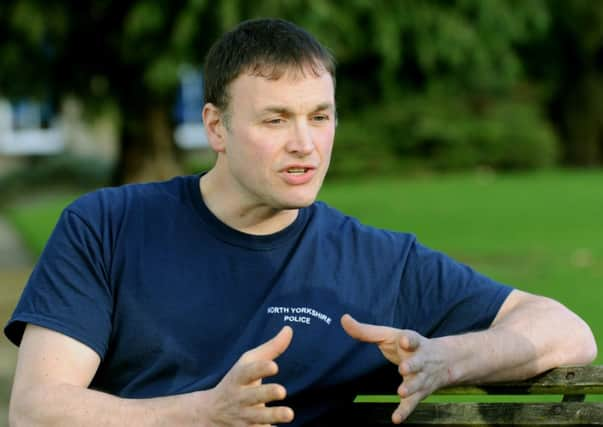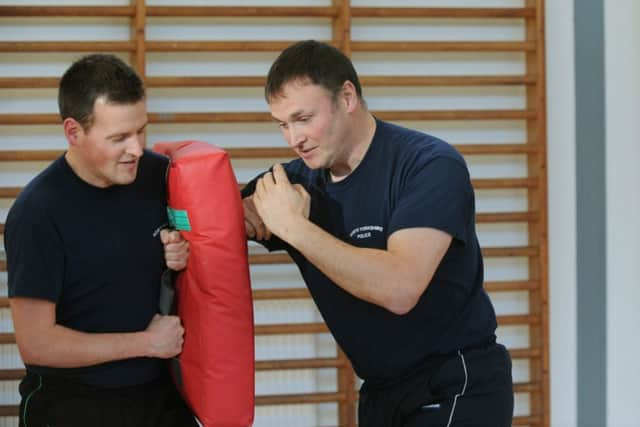Military man Adam ‘coming home’ for top police job in North Yorkshire


But for father-of-three Adam Thomson, who first served as a soldier in the air force nearly two decades ago, the chance to join North Yorkshire Police as part of the controversial ‘direct entry’ scheme was too good to ignore.
After finding out about the programme only days before applications closed in early June, the 42-year-old, who at that point was employed by the Ministry of Defence, put himself forward for the role.
Advertisement
Hide AdAdvertisement
Hide AdFive months on, and a demanding assessment process later, he is sitting talking to The Yorkshire Post at the force’s Newby Wiske headquarters set to become North Yorkshire’s first superintendent not to have joined the police service as a constable.


Mr Thomson, one of nine senior managers from other industries to have joined a police force, has served much of his career at 34th Squadron of The Royal Air Force Regiment, a ground fighting force based at RAF Leeming in North Yorkshire.
After working as a flight commander and forward air controller at various points, and with tours of Afghanistan, Iraq and Bosnia, among others, under his belt, by the time he left the RAF Regiment last September he had risen to squadron leader in charge of soldiers responsible for protecting air bases from hostile forces.
“I had always wanted to command 34 squadron and take them on operations, and I had commanded 34 squadron on operations. I brought them all back safely,” he said. “There was little more for me to do in the RAF Regiment that would give me an opportunity to command.
Advertisement
Hide AdAdvertisement
Hide Ad“I thoroughly enjoy commanding, the responsibility and the opportunity to help people grow within the organisation.
“I had spent a lot of time away from my wife and children so I was now looking at where else I could go and find the same sense of reward, the same sense of vocation and be motivated by the same morals and ethos, that had driven me into the Armed Forces in the first place.
“Then this opportunity presented itself. The first I was aware of it was around early June, the application had to be in on June 6. I just happened to find it and thought ‘I have got to give it a try, that would be giving myself stability for my family, and it would be a rewarding vocation’.”
A former student at Ashville College in Harrogate, and in the process of moving his wife and three children up from London to a new home in the spa town, he started work at North Yorkshire Police on November 10.
Advertisement
Hide AdAdvertisement
Hide Ad“During my force interview I was asked ‘why North Yorkshire Police?’. I had a lot of coherent, sensible reasons based on the type of force, the type of policing and the relationship with the community, they were all good reasons to apply to North Yorkshire,” he said.
“But when it came to it, I thought I was messing up the interview at that point, I was quite punch-drunk from the questions, but I said it was ‘coming home’.
“It is a special type of policing and a special type of relationship. I attended my interview the week after the Tour de France. That could not have been delivered in that manner by many forces, if any, other than North Yorkshire Police.”
As one of successful nine direct entry candidates from sectors including finance, law and the civil service, Mr Thomson and his fellow new recruits will spend 14 months of the training programme working in active policing, with 11 months shadowing officers at every rank to superintendent, before taking on a supervised and supported superintendent command role in early 2016.
Advertisement
Hide AdAdvertisement
Hide AdAlmost 900 applications were made for 19 posts across the country, including 67 in North Yorkshire, which planned to recruit two people to the positions but in the end only chose one.
There are approximately 800 superintendents in England and Wales who have operational responsibilities for local divisions and major investigations. First launched early this year, the idea of direct entry at superintendent level is described as ending the point of principle established by Sir Robert Peel, the founder of modern British policing in 1829, that all officers began as constables.
Policing Minister Damian Green said at the time said the combination of new blood from other fields and the internal talent already in place would ensure the country has “a police force that is even better at fighting crime.”
But critics of the policy say it creates unnecessary risks by allowing recruits with no first-hand experience of policing to potentially take charge of major incidents.
Advertisement
Hide AdAdvertisement
Hide AdThere is still some opposition to the scheme from the Police Federation, which represents rank and file officers. North Yorkshire branch chairman Mike Stubbs said: “The thing we can’t get to the bottom of is how much all of this has cost nationwide, but we think it has cost a fortune.
“They only ended up with half the number of direct entry entrants they wanted but they spent a fortune on it and continue to. I have not met [Adam Thomson] and have nothing in any way, shape or form against him, but we believe it is an expensive and unnecessary scheme. There are more than enough talented people in the organisation that we should be focusing on developing them.”
In response, Mr Thomson says new superintendents “have all been leaders in highly challenging environments”, in his case leading British forces on operations, and are put through a “very comprehensive and demanding course” of assessment at each stage of their 18-month probation.
He adds: “You can disagree very easily with direct entry superintendents, you can say that is not how Robert Peel wanted the police force and that is not how the police force is. But that decision has been made, and once it has been made and they have decided to put somebody in, I have been selected. You can deal with the decision by our political lords and masters, or you can deal with Adam.
Advertisement
Hide AdAdvertisement
Hide Ad“I believe by the time I have done my probation I will be ready to be a superintendent in North Yorkshire and that I will have a lot to offer with my broad background.”
He joins at a time of dramatic changes within policing in the face of funding cuts that will see North Yorkshire Police shrink by six per cent between 2010 and 2015.
Mr Thomson is realistic that further changes will be needed, but says: “What we have to be careful of is that we don’t confuse some important things, even at the lowest levels, with efficiencies.
“There are times where you can do something that is very efficient but that is not the right thing to do. The other side of that is that you don’t need to hold onto things just because they’re the way it is done. You have to distinguish whether something is important in keeping the policing mission, or something is important because policemen have done it for a long time.
Advertisement
Hide AdAdvertisement
Hide Ad“The benefit of having someone like me come in is that you can see one side of that question, but the disadvantage is that I can’t necessarily see the other side. You have to make cuts, we have no choice in that, but you have to be very careful about how you do that and make sure you do it intelligently and be conscious of the consequences.”
Plans to recruit superintendents from other industries first emerged in 2012 in a report on modernising police working practices.
West Yorkshire Police received 47 applications from a wide range of backgrounds but approved none. John Lacken, a former Army man turned operations officer with online shopping giant Amazon, quit days before he was due to start with Sussex Police.
Though 19 positions were initially advertised, only nine were filled. According to the College of Policing, the cost of each successful applicant is £120,000 per person, £90,000 of which is salary, though this does not include the cost of recruitment and the assessment process for the scheme as a whole.